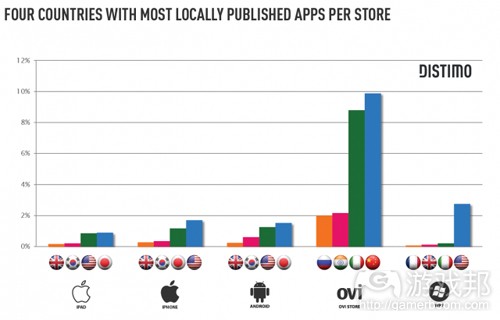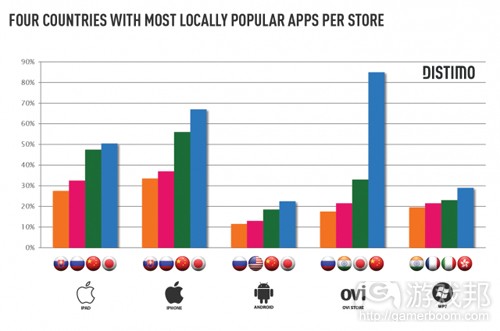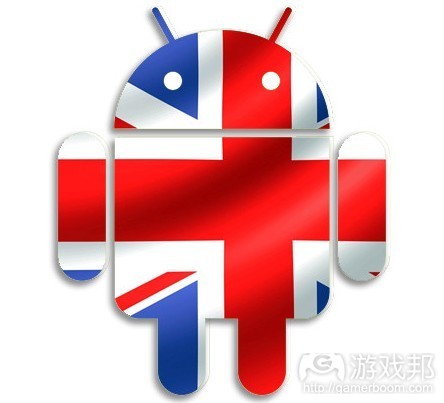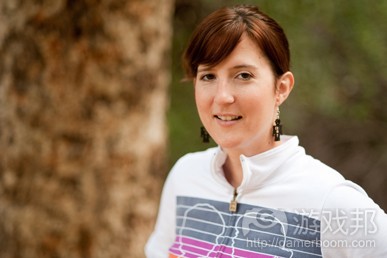每日观察:关注Distimo对本土化应用的调查(9.28)
1)移动分析公司Distimo最新报告指出,从全球范围来看,诺基亚本土化应用(仅在某个国家或地区发布的应用)比例最高,达到29.4%,iPad平台的App Store本土化应用最少,所占比例仅为3.4%。
iPhone本土化应用比例为5.2%,Android为4.9%,Windows Phone占3.5%,但Distimo并未对RIM手机应用进行调查。
诺基亚Ovi Store的本土化应用主要指向中国和意大利,有两家意大利发行商在Ovi Store中推出的应用所占比例将近9%,这两者在意大利已发布8000多款应用(主要是铃音和壁纸产品)。Distimo报告显示,由空中网、Tom Oline发布的游戏,以及通过中国广电总局发布的视频内容在诺基亚中国Ovi Store已达5845个应用。
美国地区的iPhone App Store已有7158款本土化应用,从App Store(包括iPhone和iPad平台)、谷歌Android Market的合并情况来看,美国、英国、韩国和日本的本土化应用分布较为持平。
尽管iTunes App Store发布的本土化应用数量庞大,但其美国本土化应用所占比例却相对较低。在前100名热门iPhone应用中,美国本土化应用仅占22%;在前100名热门iPad应用中,美国本土化应用比例为19%。
中国和日本的本土化应用比例最高,本土化应用将成为未来全球移动领域的一个发展趋势。
Distimo还发现美国热门应用在其他英语国家也较受欢迎,但在日本与中国则较无市场。墨西哥和阿根庭热门应用的重叠比例高达60%,比利时、荷兰和法国热门应用的重叠比例为51%,德国、澳大利亚和瑞士的同一比例为57%,中国和新加坡的这一比例是25%,中国与其他地区热门应用的重叠比例平均为16%。
2)据insidemobileapps报道,不久前刚加入Glu Mobile任业务开发主管的Sarah Thomson日前又跳槽至OpenFeint,担任后者的开发者关系主管。在此之前,她曾是IUGO Mobile Entertainment公司高管。
OpenFeint被日本社交平台GREE收购不足六个月,原首席执行官及创始人Jason Citron就被GREE另一名高管Naoki Aoyagi所取代,在被GREE收购之时,Citron掌握着OpenFeint平台17.4%的股权。
3)应用搜索引擎Chomp最近向移动广告领域进军,支持开发者竞标搜索和关键词广告以便产品获得更大曝光率。
与谷歌AdWords一样,Chomp的竞价广告允许开发者设定每天最大支出额,或者针对某个关键词的最大竞标价格。虽然出价最高的开发者更有可能获得某个关键词,但Chomp认为关联性更为重要。
该公司推出的是CPC广告,而非CPI广告,开发者可以针对每次点击支付10美分,也可以是2美元。据Chomp所称,尽管独立应用商店GetJar推出了展示、搜索和每日免费应用的广告单元,但其关联性不如Chomp广告服务。
GetJar已通过三轮融资筹得4200万美元,Chomp仅在去年的A轮融资中获得200万美元资金,他们认为Chomp已有大量搜索流量以及高效能的广告服务,所以应该不会再进行融资。
4)数字银行服务公司Intelligent Environment最新调查结果显示,Android在英国最受欢迎,每5名英国智能手机用户中就有一者属于Android用户,这种情况在北英格兰和苏格兰尤为明显,而伦敦用户则更青睐iPhone。
Android仍是英国智能手机市场的第一大操作系统,而苹果份额则从第一季度的26%增长至27%。
排在三名的是RIM黑莓,其用户比例已从第一季度的14%上升至19%。
5)Thatgamecompany高管(《Flower》和《Journey》开发商)Kellee Santiago在最近的访谈中表示,游戏行业总是低估玩家的水准。
在她看来,玩家总喜欢新鲜的游戏体验,同时还会考虑游戏的性价比,再加上目前游戏行业的竞争压力更大,入行门槛更高,那些只会仿制他人作品的公司应该引起重视,玩家并不傻,模仿他人的做法并非长久之计。
6)微软最近更新Windows Phone应用商店Wndows Marketplace,支持用户通过浏览器、Zune软件和Windows Phone手机直接下载应用。
该应用商店主要划分为应用和游戏两大版块,用户可使用自己的Hotmail或Windows Live帐号登录该系统,点周应用查看其截屏和评论。Wndows Marketplace在各国应用商店都推出了适用于当地用户的产品,所以用户无需担心误下载了某款无法使用的应用。
7)日本发行商世嘉将于2011年9月28日开始,首次向DeNA旗下的中国版Mobage平台(由DeNA中国子公司上海纵游网络技术有限公司运营)发布4款Android手机游戏产品。
这4款游戏分别为9月28日上线的《喜羊羊塔防大作战》和10月份即将上线的《喜羊羊大跳跃》、《喜羊羊连连看》和《魔法气泡大作战》。《喜羊羊》系列3款游戏是世嘉获得中国超人气动漫《喜羊羊与灰太狼》正版授权开发的全新手机游戏。
DeNA从2011年7月底开始正式运营中国版Mobage,今后不仅将与中国游戏软件厂商进行深入的合作,更积极推进与日本国内游戏软件厂商的紧密合作,扩充中国版Mobage的游戏数量。(稿源:DeNA)
(本文为游戏邦/gamerboom.com编译,如需转载请联系:游戏邦)
1)Distimo’s Latest Report Reveals Mobile App Localization Trends
Sarah Perez
The latest report from mobile analytics firm Distimo examines in detail the trends surrounding the localization of mobile applications. That is, which app stores tend to have a higher or lower number of apps that are published in just one country alone.
According to its findings, globally, 27% of the most popular applications are popular exclusively in one country in Apple’s App Store for iPhone. Meanwhile, Nokia’s Ovi Store has the highest proportion of apps published in just one country (29.4%) while the App Store for iPad has the lowest (3.4%).
Aside from the Nokia Ovi Store (29.4%), only a small proportion of apps are tailored to one specific country in the other vendors’ apps stores, including iPhone (5.2%), iPad (3.4%), Android (4.9%) and Windows Phone (3.5%). Distimo ignored RIM in this report, it should be noted.
The majority of the locally published applications in the Nokia Ovi Store target either China or Italy. Two large publishers accounting for nearly 9% of the Ovi catalog in Italy are responsible for this country’s appearance here: “3″ and “Dada.” Combined, they publish over 8,000 apps in Italy, primarily ringtones and wallpapers.
China is more affected by publishing restrictions, says Distimo. In China, games can only be published to the Ovi Store through licensed aggregators KongZhong and Tom Online. Videos can only go through CNR. Together, the three account for 5,845 apps in China’s Nokia Ovi Store.
Elsewhere, the U.S. and the U.K. feature the most locally published apps, with the U.S. having 7,158 apps that are exclusive to the iPhone App Store in the U.S. When the App Store (iPhone and iPad) and Google’s Android Market are combined, the U.S., U.K., South Korea and Japan are about equal in terms of locally available apps.
Despite the high number of locally published apps in the iTunes App Store for iPhone and iPad in the U.S., the proportion of local apps is relatively low, says Distimo. 22% of the 100 most popular iPhone apps and 19% of 100 most popular iPad apps are U.S.-only apps, it found.
China and Japan have the most locally popular apps, the firm reports, and, as a general trend, local apps are very popular in all the mobile marketplaces worldwide.
Distimo also examined the overlap of the top applications in the U.S. iTunes App Store, finding that top apps here tend to be popular in other English-speaking countries, but have the lowest overlap with Japan and China.
Other countries seeing overlap include Mexico and Argentina (overlap 60%), Belgium, The Netherlands and France (51%), and Germany, Austria and Switzerland (57%). China and Singapore have an average overlap of 25%, which is low, but higher than the overlap between China and other countries (average 16%).
The report then further breaks down the top paid and free apps in all the tracked app stores, both in the U.S. and worldwide. You can read more in the report, available here on Distimo’s website.(source:techcrunch)
2)Glu Refugee Thomson Finds Home at GREE’s OpenFeint on Developer Relations
By Kim-Mai Cutler
There’s more executive reshuffling afoot in the mobile games industry.
Sarah Thomson, who served briefly at Glu Mobile as its director of business development before the company did a dramatic restructuring and let go of several C-level executives, joins OpenFeint as its director of developer relations. Before that, Thomson became known for her work at IUGO Mobile Entertainment, where she led product development on Toy Bot Diaries, Zombie Attack! Implode XL and Lil’ Pirates, which was sold to Capcom.
She jumps to another company with a tumultuous recent history. OpenFeint has been a revolving door as of late with many senior executives leaving the company less than six months after its acquisition by Japanese gaming giant GREE. The deal was meant to fuel international growth for GREE, a publicly traded mobile-social gaming company that faces a largely saturated market at home in Japan.
But less than six months after the acquisition was announced, the company’s 27-year-old chief executive and founder Jason Citron, was unceremoniously replaced by GREE’s pick Naoki Aoyagi to run the subsidiary. Citron owned 17.4 percent of OpenFeint at the time of its $104 million sale to GREE.(source:insidemobileapps)
3)App Search Engine Chomp Takes Next Natural Step: Search Advertising
By Kim-Mai Cutler
Chomp, the app search engine which recently scored distribution deals with carriers like Verizon, is turning on revenue from the most obvious source — search advertising.
Developers will be able to bid on ads that appear alongside search queries and keywords that are relevant to their apps. Like Google’s AdWords, it’s an auction-based service where developers bid for the right to a keyword and can set a daily maximum spend or maximum bid price for any given phrase. A higher bid increases the likelihood that the developer will get the keyword, but Chomp says relevancy is the most important part. Interested developers can look at the private beta here.
The company is pricing the ads on a cost-per-click, not cost-per-install basis.
“You could pay as little a 10 cents a click but you might pay as high as $2,” said Chomp’s chief executive Ben Keighran, who adds that Chomp’s engine does in the “low” hundreds of millions of search queries a month. It’s possible though that if this private beta goes well, these search ads might appear in partner integrations. Chomp recently signed a deal with Verizon to power app search in the carrier’s apps on the Android phones it sells beginning this fall.
A few other companies have tried variants of Chomp’s model before. Getjar, the independent app store, has had display, search and free-app-of-the-day units, but Keighran argues that it isn’t as relevant as what Chomp offers. Getjar also raised far more funding, with $42 million in three rounds. Chomp raised $2 million last year in a Series A round led by BlueRun Ventures and Keighran thinks that the company won’t need to do another based on projections for search ad revenue.
“Realistically, we might not have to raise again,” he said. “We have a lot of search traffic and we really think advertisers are going to want to use this product.”(source:insidemobileapps)
4)Two in five UK smartphone owners use Android
by Zen Terrelonge
Google platform surging ahead of Apple and RIM.
Digital banking service Intelligent Environments says Android smartphones are the most popular in Britain, particularly in North England and Scotland while iPhone is preferred in London.
The stats show that Android is leading the British market, although Apple has still seen its user base grow from 26 per cent in Q1 to 27 per cent.
RIM claims third position with its BlackBerry users now taking up 19 per cent of the market compared to 14 per cent in Q1.
James Richards, director of mobile at Intelligent Environments, said: “From retail to financial services, businesses in all sectors are taking full advantage of the rise in consumer smartphone adoption.
“While the iPhone is the bastion of apps, this research shows that businesses cannot be complacent and must cater to Android and BlackBerry users too. More importantly, businesses should focus on mobile applications and services that bring convenience and simplicity to consumers’ lives.”(source:mobile-ent)
5)Thatgamecompany: Industry Doesn’t Recognize That ‘Gamers Are Not Stupid’
by Staff
As part of a new Gamasutra feature interview, Kellee Santiago of Flower and Journey developer Thatgamecompany suggests the industry doesn’t take gamers seriously — and credits the indie developer’s success to the discerning tastes of hardcore gamers.
However, Santiago doesn’t use that term. She prefers “literate gamers.”
“It’s interesting when people think that our games are for some weird subset of, I don’t know, experimental gamers. You know, we’ve been very successful on the PlayStation Network, and we’re talking about the PlayStation 3 audience. That’s like as pretty hardcore a gaming audience as you can get. And there is, I think, just an interest in content that’s different,” says Santiago.
According to Santiago, gamers are hungry for new experiences — particularly in the current economy.
“We’re even more, as gamers, considerate of the value for our dollar. So we want experiences that are going to be fresh and different, and there’s a lot of competition for those dollars right now, so the bar is higher,” she says.
However, companies that put out me-too games are not thinking that strategy through, she suggests. “It turns out gamers are not stupid, and I don’t think we should treat them like they are.”
While many would assume the hardcore audience would be the least receptive to games like Flower, it has turned out to be not at all the case. “That was a suspicion that Jenova [Chen] and I had founding the company, and I’m glad to find out that it’s true,” says Santiago.(source:gamasutra)
6)Windows Phone Marketplace launches: buy apps from your browser
By Hannah Bouckley
Microsoft has today updated its Windows Phone app store: Windows Marketplace.
From today, you’ll be able to download apps directly from your browser to buy apps, as well as via the Zune software and directly from your Windows Phone handset.
Using an interface that is unmistakably Windows Phone, with the same clean icons. Marketplace is split between Applications and Games, each of which
Log-in using your Hotmail or Windows Live Accounts. Click on an app to view a selection of screenshots you can enlarge, along with reviews. Choose to download directly to your handset using message or if you’re on 3G and don’t want to use date instructions can be emailed to you.
We’ve had a quick play with the new look Windows Marketplace this morning and we’re impressed. It’s very easy to navigate and it’s fantastic there’s another quicker option to download – Zune can be time consuming.
Each country gets its own specific store, with apps available in that country, so there’s no danger of downloading an app and not being able to use it.
Interestingly you can get to the web page from http://mango.microsoft.com/windowsphone/en-US/apps which also suggest that the Windows Phone 7.5 Mango update will be coming very soon.(source:recombu)

















































 闽公网安备35020302001549号
闽公网安备35020302001549号